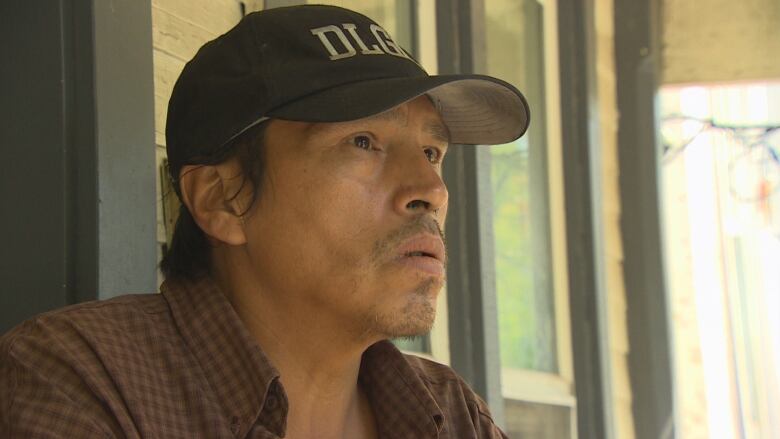Chop shops buying stolen bikes for $3-$10 — or trading them for meth
Bikes treated like currency in city's meth epidemic

From the outside, you might think this inner-city house is abandoned — it's been tagged with graffiti, the windows are boarded up and a garbage trailer sits in the driveway.
A set of bicycle rims stacked against the side of the house is the clue to what's inside this meth house.
"The bikes were all over the house, from the top third floor to the basement," said Blair Jonasson, who has been hired to clean up the property.
- Bike thefts 'one of many crimes' fuelling addiction in Winnipeg
- Winnipeg's bike theft hot spots revealed
"In the beginning, I came in and it was a ridden place with needles and clothes and stolen bikes and cockroaches everywhere. You couldn't move; you couldn't see the floor. All the windows are boarded up — a complete mess from basement to top floor."
CBC News was given a tour of the three-suite, three-storey building in the city's Centennial neighbourhood, where one woman is still living. When we entered, she was sitting in a room putting together a freshly painted white bike.
Bike parts lie scattered across the floor. She says she found them around the community.
As many as 60 stolen bikes were in this home just a couple weeks ago, Jonasson estimated.
Most were cleared out along with garbage when the squatters were recently evicted, but some still remain in the backyard and there are a few parts left inside the basement, along with needles.
Neighbours who spoke to CBC News said they were glad the house was being cleaned up, but bike thefts were the least of their worries. Kids live in nearby homes and many worried about the house being lit on fire.
The so-called chop shop is one of several that have been operating in different parts of Winnipeg.
Watch this woman work on a bike inside a boarded-up meth house:
Everything from frames to tubes, chains and rims are left by garbage bins, others are in yards.
"Neighbours call me and complain 'I can hear them sawing with a hacksaw sawing bikes up,'" said Sel Burrows, chair of the North Point Douglas Residents' Committee.
The bike frames sell from anywhere from $3-10 to scrap yards in the city, get sold online or traded for a hit of meth at a chop shop.

"These are slimy, grabby people that are doing this," said Burrows.
Burrows said he's furious about the chop shops that have popped up in his area.
"When a middle-class person loses an expensive bike, that's expensive, it's an invasion of privacy, all sorts of things," he said. "When poorer families manage to get bikes for their kids or themselves to bike to work and that's stolen, that's a huge financial hit and that demoralizes the community."

Ronnie Edward Beaulieu lives next to one of the chop shops in North Point Douglas, which is partially concealed by a tarp. The yard has several bikes and parts visible from the back lane.
"I see a lot of people left and right going back and forth with bikes," he said.
"Sometimes they just go in and out and leave and sometimes some of them [ask] if I was interested in buying a bike 400 bucks ... or 50 bucks, and then I say I don't have no money."

Officers on the street in the area said they are becoming increasingly frustrated and feel their hands are tied.
Parts are sold, bikes are rebuilt to avoid detection and police have little means to arrest, one officer said.
They need a warrant to search properties and many folks don't have the serial number for their stolen bikes or even have it registered with police as stolen.
Const. Rob Carver says getting a warrant can be tough:
People on the street say they take the bike parts to three different scrap yards in the city for cash.
Some simply sell the bicycles on the street.
Joanne Harper, who lives in an apartment in the inner city, says she can typically collect enough parts in one day to assemble one or two bikes, which sell for about $40-50 apiece.
"Basically all you'll do is ride it and somebody will ask you [to buy the bike]," Harper said.
- Winnipeg: A city wide awake on crystal meth
- Suspected drug dealer was trading meth for stolen property
She bikes around the city with a wagon collecting parts discarded by thieves, builds bikes with some of it and then sells the remainder to scrap yards. Harper says this isn't her main source of income and only does this as a side gig.
Based on how many parts she finds strewn around the city, Harper thinks bike thefts are on the rise.
"Everywhere, everywhere. Just drive around, look around and it's everywhere," Harper said.
"I just can't collect it all."




